Father Dabney put his finger on the crucial issue for the South (and for any people): There must be religious unity for a people to survive and flourish. He writes:
In what I found to be a fluid disposition, Rebecca Dillingham makes the argument, and I would agree on principle, that the South has been crippled by our denominational diversity. Although I do not agree with her conclusion that Orthodoxy is the cure, myself being more in favor of a blend of Southern Presbyterian theology and Anglican liturgy (I attend such a church); I absolutely agree that stability in the churches of the South must be addressed.
In saying this, however, he also reveals one of the main reasons why there isn’t religious unity in Dixie, although we don’t think he meant to: Folks treating religion as a DIY project. That’s what his solution for the religion question for the South boils down to, a preference for a new combination of recent arrivals in Christian history – “a blend of Southern Presbyterian theology and Anglican liturgy.”
One may discern immediately that something is amiss with this formulation according to the principle of “lex orandi, lex credendi,” which translates roughly to “The law of worship is the law of belief” (see p. 19 of this essay). There is a contradiction in blending Presbyterian theology with Anglican worship forms, as theology and worship form an integrated whole. Presbyterian forms of worship and Presbyterian theology cannot be separated, cannot be spliced together with other Protestant, Catholic, etc., theologies and forms of worship. They are mutually exclusive of one another. Such experimental religious combinations will not fare any better than the genetic splicing together of different plant and animal species that scientists have been madly going about lately.
New-fangled denominational mishmashes will not be able to withstand the attacks of the enemy over the long haul. What is needed is to find the Church that Christ established (not the one that man concocted), the one He promised that the “gates of hell shall not prevail against” (St Matthew’s Gospel 16:18). A central question we may ask, therefore, is – which Church received its form of worship from God Himself, and still uses that same order of worship? This can only be said of the Divine Liturgy of the Orthodox Church. The priest Fr George Mastrantonis says concerning this:
The Divine Liturgy is considered the most significant ancient Christian service, not so much for its phrasing and words as for its meaning. In fact, the Divine Liturgy was in practice right after the descent of the Holy Spirit on the Disciples of Christ on the 50th day after His Resurrection, as the sacred writer of the Acts of the Apostles records (Acts 2:46 ff)… The Divine Liturgy as such was the center of the inspiration of the first Christians in their communion with God and with one another.
In upper rooms and catacombs the Apostles and later the Presbyters and Bishops of the primitive Christian Church offered the Divine Liturgy for its sacred Mysteries. It seems that relics and reminiscences of that time were preserved in the Divine Liturgies of the 2nd century and especially of the 4th century when the Liturgies took their final form. But whatever were the various forms of the Divine Liturgy of the primitive Church, as well as of the Church of the final formation of the Divine Liturgy, the meaning given to it by both the celebrants and the communicants was one and the same; that is, the belief of the awesome change of the sacred Species of the Bread and Wine into the precious Body and Blood of Jesus Christ, the Lord.
The three most well-known versions of the Orthodox Divine Liturgy, with their ancient, apostolic lineages, are listed and described by Fr George:
St. Basil’s Liturgy is attested to not only by the Penthecte Synod (692 A.D.) but also by his friend Gregory of Nazianzos, who in his Funeral Oration said that Basil wrote “provisions of prayers, decencies of the Altar;” also by Leontios the Byzantios who put the Prayer of Oblation of Basil together with that of the Apostles; thirdly by the letter of the Monks of Skythia to the African Bishops (520 A.D.) reporting that almost the entire East repeated the Liturgy of St. Basil. Those are a few documents, among many others, establishing St. Basil’s Liturgy as a genuine work. St. Basil’s Liturgy is celebrated about 10 times a year, including the Sundays of Lent.
The Liturgy of the Presanctified Gifts is very ancient, “known to the Church before the initiators Basil and Chrysostom” as Patriarch Michael (12th century) infers. It is ascribed rather to Apostle James or Peter. The information that Pope Gregory, the Dialogos, wrote this Liturgy is untrue for many reasons, among them that he did not know the Greek language. As for the use of this Liturgy the 52nd canon of the 6th Ecumenical Synod refers to it, decreeing that “in all the fasting days of Lent, save Saturday, Sunday and the day of Annunciation, the sacred celebration of the Presanctified Gifts should take place.” This Liturgy is celebrated in connection with the vesper service during the evenings. It keeps its venerable character even now whein it is officiated during the mornings. It is called that of the Presanctified Gifts because the Sacred Gifts have been sanctified previously in the Liturgy of St. Basil or St. Chrysostom. This Liturgy is not officiated for the awesome change of the Gifts, but rather for the partaking of the Presanctified Gifts by the faithful Christians.
St. Chrysostom’s Liturgy is well known and very common in the Eastern Orthodox Church. It may be celebrated every day of the year except the ones of St. Basil and those of the Presanctified Gifts, and on Good Friday. It is shorter than that of St. Basil and much reduced compared to St. James’. St. Chrysostom’s Liturgy put an end to the free prayers and hymns in the officiation of the Holy Eucharist. This Liturgy placed a seal on the free forms of the re-enactment of the Mystic Supper of the Lord, depicting it in its finest form with a destiny of enduring far into the future. Despite the addition of hymns at later times, the St. Chrysostom Liturgy remains the same majestic religious masterpiece with grandeur and dramatic appeal matching the human expression and the divine act. St. Chrysostom (345-407A.D.) was an eloquent preacher, writer and one of the Fathers of the Orthodox Church, whose writings have been translated into many languages and have nourished the Christian Church throughout the centuries.
Fr George makes the unforced error of calling her the “Eastern Orthodox Church,” but this obscures the fact that the Orthodox Church is universal, for all peoples, and that she was in fact the original Church of the lands of the West. There is a wonderful hymn dedicated to all Orthodox saints of the West that illustrates this truth. Here is a part of it (Ikos 4):
With joy ye shed your blood for Christ, O venerable martyrs, and to Him ye offered yourselves as a well-received sacrifice. And the peoples of the West, seeing your unspeakable patience, understood that the God of Glory Himself dwelt within you, and marvelling at such a thing, with faith began singing to you thus:
Rejoice, Tatiana and Anastasia, together with Sophia and her three daughters!
Rejoice, Cecilia and Agnes, who showed yourselves women unequalled in courage!
Rejoice, Laurence, archdeacon, together with Sebastian, the glorious martyr of Christ!
Rejoice, good victors, for through your unspeakable passions ye hallowed pagan Rome!
Rejoice, all ye who filled all the lands of the West with your struggles!
Rejoice, Agatha and Lucy, praised martyrs, for in Italy ye fought the good fight!
Rejoice, Valentine and Januarius, enlightened bishops, for ye sealed your teaching with blood!
Rejoice, Cyprian, hierarch, together with Perpetua and Felicity and all those that laid down their lives for Christ in the African lands!
Rejoice, Maurice, wonderful martyr, for in the Swiss lands alongside thy soldiers thou didst fearlessly stand up in the face of death!
Rejoice, Vincent, deacon, for thou didst hallow Spain through thine unimaginable torments!
Rejoice, Alban, valiant warrior, for thou didst offer thyself as the first pure sacrifice of Britain to the true God!
Rejoice, Ursula, bride of Christ, who with thy blood washed the German lands!
Rejoice, all ye Saints, that in the lands of the West confessed the true faith!
Fr Andrew Phillips of England also has numerous writings relating to Orthodoxy in the West, and there is now the Ludwell Orthodox Fellowship for the specifically Southern expression of the Orthodox Faith.
Later additions to the Orthodox Church’s Divine Liturgy also have heavenly origins. For example:
During the reign of Emperor Theodsios II (402-450) the city of Constantinople was shaken by earthquakes for nearly four months. At that time several churches, houses, and the city’s stone walls collapsed and were destroyed. All the inhabitants of the city were terrified. Patriarch Proclus (November 20) organized a barefoot Cross Procession and solemnly prayed for God to protect them. While this was taking place, the tremors increased dramatically, and a young boy in the crowd was lifted up into Heaven by some invisible power, and the people, cried out, “Lord, have mercy.”
After returning to earth, the boy told the people that he had heard the Angels glorifying God by singing “Holy God, Holy Mighty, Holy Immortal, have mercy on us,” and that a voice had commanded him to tell Patriarch Proclus that henceforth the people should supplicate God in this way, without adding anything to it. The Patriarch instructed the people to sing this hymn, whereupon the ground stopped shaking and the child reposed.
From that time the hymn was inserted into the Divine Liturgy, just as it was sung by the people during the earthquake, and as it is still sung up to the present day.
But we do not want to belabor the reader. If he wishes to explore further on these points, we pray that the Lord Jesus Christ would guide him.
We also thank again Father Dabney for raising this most important of subjects. There never was a people who survived without being dedicated to a divine order of some sort – whether Jews, Christians, Muslims, Hindus, etc. Uniting the South in the Christian Faith is therefore the highest priority. May the All-Holy Trinity have mercy on us and help us to achieve this unity (Ephesians 4:1-6)!
-By Walt Garlington

O I’m a good old rebel, now that’s just what I am. For this “fair land of freedom” I do not care at all. I’m glad I fit against it, I only wish we’d won, And I don’t want no pardon for anything I done.

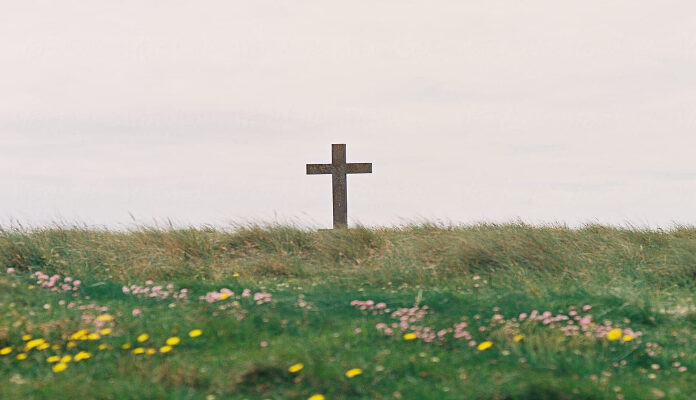
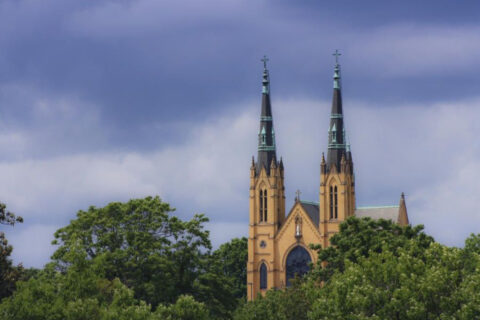
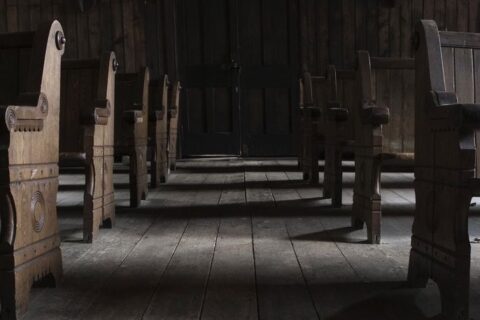
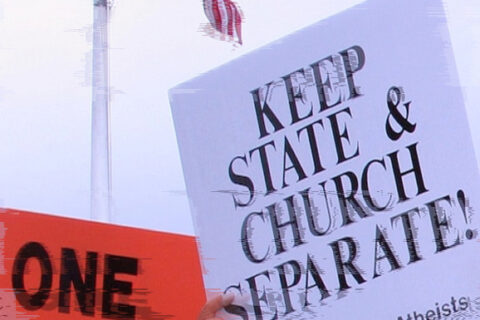
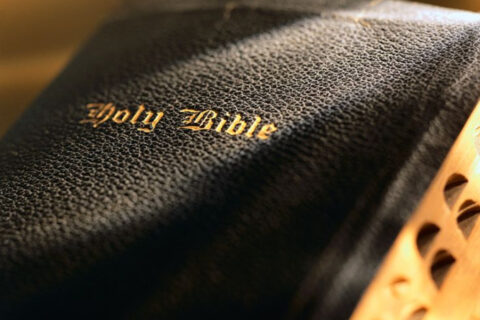
The Orthodox Church is the only “church” period anything else is schism or heresy. The Protestant Reformation was a rebellion against Christ and the true deposit of the faith.
I wholeheartedly disagree on nearly all points of Orthodoxy Christianity, as well as Catholic and Protestant religions, in all their various forms.
Wish we would stop posting about Dixie needing an official religion. If you accept Christ as your Savior, that should be enough. We will never agree with all points on religion. We should focus on Dixie instead of proselytizing.
Yeah this is the point Andrew Torba makes in his book on Christian dominionism: you need some sort of ecumenism in a country like America because, as a matter of realpolitik, you’re simply not going to get 300 million Americans to agree on a single denomination
Its actually not a bad book TBH, although is a bit spergy at times
https://www.amazon.com/Christian-Nationalism-Biblical-Dominion-Discipling/dp/B0BCRZSHM3
I am a Protestant. Dixie is Protestant. Orthodoxy did nothing to create the South. It’s a Johnny come lately religion that is seeking to opportunistically position itself as the USA implodes.
What we need is a return to the Reformed faith that founded the initial states. Baptists and Presbyterians have more in common than what some of these people pushing Orthodoxy believe.
The South is a Protestant land and I will resist the OrthoBros attempts at highjacking Southern Independence.
You have no need to worry brother, Eastern Orthodoxy will never be more than a tiny sect within Dixie. The arrogance of its more vocal adherents will be its undoing. But I still love my Ortho Bros.
Note: There is only one Church, it has many iterations around the World, it has had many councils, many multiple sectarian splits, ( even in Orthodoxy) and it it still has them. The Church, it is like seeds of one fruit blown by the wind, when it finally is buried in the soil, it blooms according the nutrients in that soil, same fruit slightly different taste.
The standard are the Scriptures, compare everything to them, and they alone. Creeds are good, council are good, but it is the Word of God that stands forever.
TBH, to say that Eastern Orthodoxy is trying to position its self to become more popular as the mainstream American culture declines REALLY gives EO a lot credit and assigns it a lot of agency that’s totally undue
Orthodoxy literally makes ZERO effort to evangelize or spread its self outside of the various ethnic communities / ghettos
The process is this:
(1) ethnic (Serb, Rus, Greek, etc) immigrants settle in an area
(2) an ethnic EO church is established in that area
(3) several generations later, all of the original ethnic families have married outside of the ethnos, and only a fraction of these later generations have any loyalty to the EO church and/or identify with the OG identity of the (great)grandparents
(4) the only reason the ethnic EO church continues to exist is because of newly arrived immigrants from the origin country
For better or worse, Orthodoxy in America is a totally dead end. It will never lead anywhere and it doesn’t matter how many socially ailenated spergy Internet converts spam about it online, it will always remain just that
Not to mention that, even in most Eastern Euro countries where in EO is the main or even the state religion: Russians, Greeks, Serbs, etc aren’t actually as piously religious as the extremely online American OrthoBros like to make them out to be. The religion has high “membership” there because the default is for all newborns to be baptized into the church, whether or not they ever go to church
Sorry to go off on all this, I do actually like EO and think that, if one is to be a Christian, that EO is the correct denomination. This post is just a reality check to certain extremely online people
P.S. and yes, the online Orthobros are extremely annoying and probably do more to push people away from EO as they do to attract
I adhere to the 5 solas of the Reformation including sola scripture. However, NS Germany wrestled with this question at great length and I like the conclusion of Georg Usadel:
“Within the circles that trace their existence to the Almighty, mutual respect must be demanded. … Those who let the law of their action be determined by the eternal, belong together, for both are enemies of those who designate material and the moment as the depth of their sick conscience.”
I really believe the “without which, not” of Christianity is the substitutionary atonement. Many (not all) of the NSDAP luminaries missed the mark in not having it at the center of their faith. However, I think we can have common cause, (if not fellowship and communion), with those who, like ourselves, are at enmity with ‘those who designate material and the moment as the depth of their sick conscience.’
@Father Dabney you are completely wrong. It is the historic church aka Orthodox that gave us the scriptures. As a Protestant you cannot even know what the canon is nor do you have an objective grounds to even begin without the church. Period end of story.
Dixie Orthbro said: “its the historic church aka Orthodoxy that gave us the Bible…”
This is one of those true -vs- not true things depending on how you want to slice this particular proverbial onion
Take this example:
There was a political entity called “America” that was founded in 1791 with the ratification of the US Constitution. This entity existed in some form or another up until either 1965 (Hart-Celler Act), 2008 (Obama’s 1st term), or 2020 (first explicitly stolen election)
The position of myself and other people who use read dissident right blogs is that, although the de-jure government of the USA is still the same as in 1791 (E.G. we still have the same executive, judicial, and legislative branchs, the same Constitution), although the flag is still the same (sans # of stars), and although politicians and militarymen still swear the same oath to the same constitution in 2023 as 1791, its de-facto not the same government at all, but a possessed or zombified or vampire government that takes on the appearance or identity of the previous government
In the same way that we 2023 Americans don’t consider ourselves enemies of the *real* US Govt (remember, Dixie voluntarily adopted the same constitution in 1791) for opposing the current entity which calls its self “America”, Protestants don’t consider themselves heretics of apostates for calling themselves Christians even though Orthodox or Catholics have, in a formal and institutional form, used the term “Christian” to refer to themselves chronologically much longer
Like, a US congressman, senator, judge, or president could say to us dissidents: “we were actually elected according to the US Constitution and are formally apart of America and swore an oath to defend it, whereas you’re just some person posting on the Internet. We have much more right to call ourselves ‘Americans’ than you do”… That’s the political equivalent of what a Catholic or EO would say to a Protestant, the same thing Joe Biden would say to like, Jared Taylor
I’m not really a Christian except in a cultural sense, so I have no dog in this fight. That’s just what I would say if I were a Protestant
@FatherDabney, sir the error you make is equating Protestantism with true authentic Christianity. Protestantism is not authentic Christianity period. The South collectively has been wrong in this area and I’ll tell anyone this. Every form of “Christianity” is heterodox except for Orthodoxy. So if you are trying to war with the truth then you will lose. Don’t attack Orthodoxy and not expect to be called heterodox.
Protestantism is one of the key cornerstones of the South I completely reject. Orthodoxy is the only true historic form of Christianity, PERIOD. All other forms are not the full deposit of the faith handed down to us by Christ and the apostles.
Walt Garlington
This is Memorial weekend in the United States.
Why were Russian war ships in New York harbor and San Francisco Bay during our 2nd war for independence protecting our tormentors? You have a lot of nerve bringing that article here on Memorial Day week end as we reflect upon our Southern Ancestors sacrifice that they made for us, while you bleet on about that Russian fraud of a church that failed Russia and sold out to the global oligarchy centuries ago.
“No history is a matter of record, it is a matter of Faith”
James Branch Cabell
God Bless Dixie
Thank you for your comment. This comment section, on this topic will open up a good debate .
Identity Dixie has a very special post for Memorial Day.
Why does ‘outside looking in’ think its in any way/shape/form even relevant in 2023 to bring up the decision of a Russian tsar or naval general to put his warships in XYZ location before any of us were ever even born?
Ahh yes, the “True Church.” We are the real church, preaching the true salvation, everyone else is going to hell. No matter where I go it is the same. No one agrees, but then, they also do not agree to disagree. It is all so tiresome really. I cannot claim to be better, as I am not, however, I am quite open minded to all. I was born and raised hardcore, independent, fundamental Baptist. Everyone is false, teaching falsehoods and heresies. Everyone is going to hell, or so the fiery, scary pastor I grew up with would have you believe. I often say that the Baptist theme song is Twisted Sister’s “Burn in Hell.”
That being said, I do not believe anything but what I have read in the Bible, period, hence the Baptist. These divisions have caused nothing but bloodshed, hatred, distrust and all other anti-social schisms within the Church and no true solidarity. What could be the solution? I definitely do not think a one church thing will work. The only thing that could bring all of us together is the Bible and Christ, not, what is it, ah yes, liturgies, ceremonies, magic crackers or whatever.
The Church Christ founded is the Roman Catholic Church. This is not even arguable. Only it can be traced back to the beginning of the Christian Faith. It too, in its human constitution with the Judases within it has suffered the assaults of modernity. However, the traditional Latin Mass and traditional practices and fidelity to ancient truths still exist. I am a proud Southerner and proud Roman Catholic. Deo Vindice.
Lisa is correct.
The Roman Catholic Church (aka The Church) is the ONLY one that can be traced ALL the way back.
This is a purely academic and intellectual discussion, of course.
No Presbyterian Southerner is going to come be a Traditional Latin Mass Catholic based on my words alone, any more than I would go be a Presbyterian.
And that’s OK.
Someone above said it best: as long as we all can agree that Our Lord is our Savior, then we are on the right track.
I’m open to Protestant prayers around the dinner table, if they’re open to my standardized “Bless us oh Lord, and these Thy gifts….”
Only when the Lord returns in glory, will we (fallen man) be able to reconcile the minutiae of what we are discussing here.
But my question (after moderators hopefully approve ), still stands.
Think of it as a mental puzzle.
I’m sure Lisa knows the answer.
Why do Satanists still, to this day, celebrate Black Mass?
The “Black Mass” isn’t a real thing except to the extent that people doing ad-hoc, disorganized, and meaningless (I.E. sp00ky woo) mockeries of Roman Catholic liturgy are a real thing. Its a conspiracy theory on the level of “children are being sacrificed in the basements of daycare centers” hysteria back in the 1980s. Further reading, subsections 1-3 of this essay: https://hermetic.com/crowley/articles/black-magic-is-not-a-myth
If you consider Thelema and Aleister Crowley to be satanic, then the Gnostic Catholic Church (http://oto-usa.org/oto/egc/) celebrates the “new aeon mass” at close to 50 locations across the USA– with the goal of a minimum of 1 mass a month at each location
Thanks for the info Benjamin, I’ll check it out.
But only if you do more research into black Masses and exorcisms.
The reason for the former, is related to Transubstatiation.
The bad guys can use the actual parts of Our Lord, to desecrate.
No other church has Transubstantiation.
Commemoration? Sure.
But that’s a poor substitute.
There was in instance early on in the Gnostic Catholic Church wherein consecrated RCC communion wafers were stolen and used in a mass, but that’s not really a common practice at all
There is definitely a lot of weird stuff that goes on in the Roman church that doesn’t exist in other denominations, like Orthodoxy and most Protestantism
It’s bizarre the divide that exists between the Roman laity, who are often the most intelligent and sincere faithful, people who walk the walk, and the hypocritical and corrupt Roman clergy
I guess it’s a theory vs practice dichotomy
RE: Transubstantiation
There’s no reason Orthodoxy couldn’t fit into your schema, at least in theory.
The main difference between Catholicism and Orthodoxy is the doctrine of Transubstantiation, but this is mainly a difference in terminology rather than belief
Both RCC and EO believe the wafer literally becomes the body of Christ, but only RCC demands that one believe that it becomes the body of Christ via the mechanism of transubstantiation. Technically, a Catholic could probably be excommunicated for not believing in that dogma
There’s no reason an EO adherent couldn’t personally believe that transubstantiation was taking place when he took communion– he is only barred from holding, as dogma, that transubstantiation had taken place. The EO considers the exact mechanism via which it takes place to be a “mystery”
Protestant sects which believe in the real presense of the Lord in the wafer would fit into this as well
Every denomination claims to be either the continuation of what Christ established or the restoration of what Christ established. But the New Testament looks to me like it was the church that the Apostles established after the Ascension.
Anyway, until I find a church that is willing to unpack the Gnostic ban on plural marriage (aka polygamy) which was enacted in 400AD (one year before married priests were ordered to divorce their wives), and is provably Gnostic in origin, (unless you are determined to deny it to the bitter end, in which case no amount of evidence will ever be enough), then I am going to call BS on all of them.
If anybody wants to “get back” to the church that “Christ Himself established” then please start with the elephant in the room and I’ll at least be intrigued enough to raise an eyebrow. Until then I am not going to be impressed… And as we witness our own genocide all around us, what could be a more relevant question for us to tackle than how many wives a man can have?
If its worth anything to you, Martin Luther himself said that he found no evidence that the practice of polygamy was incompatible with either the Bible or Christianity
But realistically, you’re not going to find a church that endorses that outside of either something super liberal like Unitarian Universalism or one of the fundamentalist Mormon offshoots. Horseshoe theory confirmed, lol
I would imagine a polygamous Mormon compound would accept you if you brought your own wive or wives with you and weren’t expecting to convert to horn in on their action (giggidy giddidy). A lot of those sects are basically self-sufficient agricultural communities and would be a great place to be if or when poop hits the fan. You wouldn’t be dependent on outside society for your daily bread
This is exactly what we should be building, not joining the Mormons in their version.
I am in the process of watching “The Chosen” series about the early church in the time of Christ. There were no church buildings then people met in homes. There was no organized church each one was independent and often got in doctoral errors which is the reason for all the epistles of Paul. I think the apostles believed Christ to be a warlord messiah who would overthrow Rome. The cruxifixion threw them for a loop. When the resurrected Christ came back and gave them the Great Commission I still think the apostles expected the second coming of Christ to be in thier lifetimes or at least in the time of thier children. The church’s jouney into apostasy is lllustrated symbolically in Revelations.